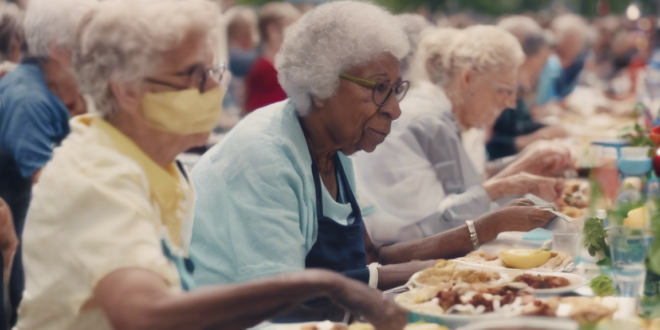March for Meals: Supporting Nutrition and Dignity for Seniors Across America
As our nation’s population ages, the critical issue of senior nutrition has never been more important. March for Meals represents a powerful movement dedicated to addressing food insecurity and nutritional challenges faced by older adults across the United States. This annual campaign highlights the crucial role community support plays in ensuring our seniors maintain their health, independence, and quality of life.
Understanding the Nutrition Crisis for Older Adults
Millions of seniors face significant nutritional challenges that extend far beyond simple hunger. Malnutrition among older adults is a complex issue with profound health implications. According to recent studies, approximately 7.2 million seniors in the United States struggle with hunger, with many more at risk of inadequate nutrition. These challenges stem from various factors, including limited mobility, fixed incomes, social isolation, and health conditions that make meal preparation difficult.
The Impact of Proper Nutrition on Senior Health
Proper nutrition is not just about filling a plate – it’s about maintaining quality of life and independence. Seniors who receive adequate nutrition experience:
• Improved immune system function
• Better management of chronic health conditions
• Enhanced mental clarity and cognitive function
• Increased energy and mobility
• Reduced risk of hospitalization
• Improved overall emotional well-being
How You Can Make a Difference: Multiple Ways to Support
Supporting senior nutrition doesn’t require extraordinary efforts. There are numerous accessible ways individuals and businesses can contribute to this critical cause:
1. Dining Out with Purpose
Many local restaurants participate in March for Meals by donating a percentage of proceeds during specific days. By choosing to dine at these establishments, you directly support meal delivery programs for seniors. These collaborative efforts transform a simple meal out into a meaningful community contribution.
2. Corporate Catering Initiatives
Businesses can play a significant role by partnering with local senior nutrition programs. Corporate catering events can include donation components, where a portion of catering costs supports meal delivery services. This approach allows companies to demonstrate social responsibility while providing practical support to vulnerable community members.
3. Volunteer Meal Delivery Programs
Local organizations like Meals on Wheels consistently need volunteers to help deliver nutritious meals to homebound seniors. By dedicating a few hours each month, individuals can make a direct, tangible difference in seniors’ lives. Volunteers not only provide meals but also offer crucial social interaction that combats isolation.
4. Financial Contributions
Monetary donations remain a vital support mechanism for nutrition programs. Even small contributions can provide multiple meals for seniors facing food insecurity. Many organizations offer transparent reporting on how donations are used, allowing donors to see the direct impact of their generosity.
Technology and Innovation in Senior Nutrition
Emerging technologies are revolutionizing how we approach senior nutrition. Mobile applications now connect seniors with meal delivery services, while telehealth platforms offer nutritional counseling. These innovations make accessing proper nutrition more convenient and personalized than ever before.
Community Collaboration: A Holistic Approach
Addressing senior nutrition requires collaborative efforts from multiple sectors. Healthcare providers, local governments, nonprofits, and community members must work together to create comprehensive support systems. This holistic approach ensures that nutritional support goes beyond mere food delivery, encompassing education, accessibility, and dignity.
Understanding Nutritional Needs of Seniors
Seniors have unique nutritional requirements that differ from younger populations. Factors such as decreased metabolism, potential medication interactions, and age-related health conditions necessitate specialized dietary considerations. Nutrition programs focus on providing balanced meals that address these specific needs, ensuring seniors receive essential nutrients.
Economic and Social Benefits
Investing in senior nutrition yields significant societal benefits. By supporting older adults’ nutritional needs, we:
• Reduce healthcare costs associated with malnutrition
• Promote senior independence
• Strengthen community social bonds
• Demonstrate intergenerational solidarity
Getting Involved: Next Steps
Interested in supporting March for Meals? Start by:
• Researching local nutrition programs
• Connecting with community senior centers
• Following local March for Meals events
• Spreading awareness through social media
• Encouraging workplace involvement
Conclusion: A Collective Responsibility
Supporting senior nutrition is more than a charitable act – it’s a collective responsibility that reflects our society’s values. Every meal delivered, every volunteer hour contributed, and every donation made represents a commitment to honoring our seniors’ dignity and well-being.
This March, join the movement. Together, we can ensure no senior faces hunger alone.
 Good Calories Guide GoodCalories Guide focuses on nutrition, healthy eating, and overall wellness. The site offers practical insights into evidence-based dietary practices, including tips for specific lifestyles such as veganism, keto, and family-friendly meal planning. It also addresses unique nutritional needs for individuals with conditions like diabetes or food allergies, while providing quick and accessible recipes to make healthy living a sustainable and enjoyable choice.
Good Calories Guide GoodCalories Guide focuses on nutrition, healthy eating, and overall wellness. The site offers practical insights into evidence-based dietary practices, including tips for specific lifestyles such as veganism, keto, and family-friendly meal planning. It also addresses unique nutritional needs for individuals with conditions like diabetes or food allergies, while providing quick and accessible recipes to make healthy living a sustainable and enjoyable choice.


